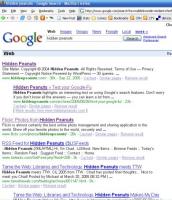I’ve been discovering a bunch of quality net-published fiction recently. Here’s a couple worthy of your time.
David Wellington’s Monster Planet is on track to wrap up this Friday. Wellington started the ambitious blog-based trilogy in April of ’04 with Monster Island, a story of a zombie-infected Manhattan a few months after the outbreak.
He followed it up with Monster Nation, the prequel of just how the zombie outbreak progressed across the United States.
Monster Planet brings everything to a head – grand fantasy, horror and characterization on a global scale. The pentultimate chapter hits on Wednesday, and the finale on Friday.
You might think that zombie stories = mindless crap. And in some cases, you’re right. But Wellington wisely focuses on his characters, and just how the situation affects the ensemble cast. He’s got a couple of “big ideas” that play with the genre conventions too, which I won’t spoil.
Half of the fun has been following the comments readers leave after each chapter. In some cases Wellington has subtlely shifted his story arc thanks to audience input. Not an entirely collaborative story, but there are elements. In perhaps the most obvious one, the main villain of Planet is named after a very frequent and loyal commenter. Elsewhere, when fans felt that it was left up in the air whether a particular character survivied, the author made sure to spell out in a later chapter just what fate had befallen the man. One reader was having a rough time with his relationship, and Wellington obliged him in a cathartic bit of fun by making the girl a zombie-ized background character. The list goes on.
The serialized, ‘cliffhangerized’ format is addictive. I plowed through the first two novels in just a few days after discovering them. And hey, its free!
In other options, there’s Cory Doctorow. I’m a bit of a latecomer to the BoingBoing founder’s fiction, but he’s got a pretty decent archive up on Salon.com.
Currently, Themepunks updates with a new chapter every Monday. This is a story of Doctorow’s vision of the 21st century economy, and where collaborative technologies and abundance of raw tech materials will eventually take us. There’s a thousand and one points in here where I paused to think about the implications of the astonishingly realistic setting.
If you’re at all interested in the development of societies in massively multiplayer games such as World of Warcraft, 2004’s Anda’s Game is fascinating. You have to trudge through Salon’s somewhat clunky ‘sitepass’ system to read these stories without subscribing, but the result is worth it.
In other news, Harvey Danger released their newest album (for free!) in MP3 format today.

